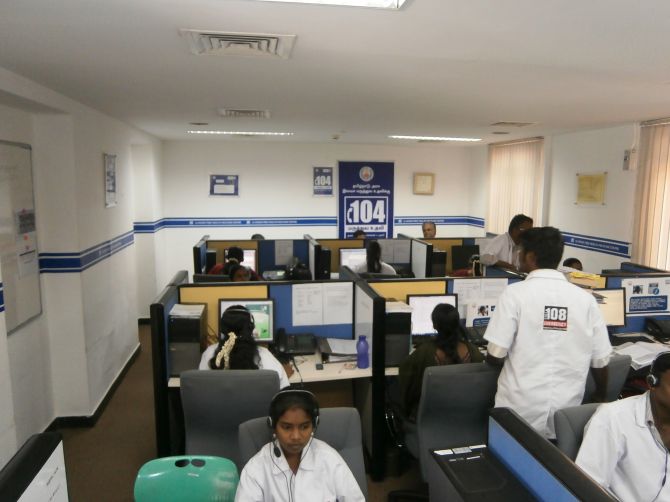 Rediff.com's A Ganesh Nadar visits the bustling centre that hosts Tamil Nadu's Health Helpline that answers more than 100 medical queries an hour.
Rediff.com's A Ganesh Nadar visits the bustling centre that hosts Tamil Nadu's Health Helpline that answers more than 100 medical queries an hour.
On December 30 last year the Tamil Nadu government launched a round the clock Health Helpline where residents of the state could dial 104 and get medical advice, information about first aid, HIV/mental health counselling and also register complaints against services provided at government hospitals and primary health centres.
The helpline also provides information about communicable and non-communicable diseases, nutrition, sexually transmitted diseases and facilities available under the chief minister's comprehensive health insurance scheme, hospitals and medical centres which offer treatment for specific ailments.
Calls are answered in Tamil, English and Telugu.
The centre has been set up as a private public partnership. The Tamil Nadu government. has teamed up with GVK Emergency Services to run the show.
The government has provided space for the centre at the Kasturibai Public Hospital in Triplicane, Chennai.
While it looks like any other call centre, the major difference is that the phones are manned by doctors, staff nurses and qualified counsellors.
In the first month, the centre answered 69,000 calls from across the state -- 2,300 calls a day or almost 100 calls an hour.
"The phone rings continuously, we ask them for their names and address which some hesitate to give. We explain that it helps next time they call. We give them a register number which they can use the next time they call," says Rashmi at the centre.
The second time they call and provide the register number, the person's case history appears on the computer screen, which helps the person responding to the call.
"We ask what the problem is and then transfer the call to either a doctor, nurse, counsellor or administrator as the need may be," says Gomathi, a science graduate manning the phones.
"Many calls are about small ailments. Some want a second opinion about a drug they are taking. We don't prescribe drugs, but refer them to the nearest government hospital," adds Rashmi.
Florence, a staffer who has done her BSc in nursing, says, "For small ailments I advise them what to do. Many want to know about sexually transmitted diseases and preventive measures. For major health problems I tell them to go to the nearest hospital."
Hemalatha has a master's in sociology and is a counsellor at the centre. "I mostly handle depression and family problems. We are trained to encourage such callers, to make them feel better about themselves."
"Sometimes alcoholics call. They have low self esteem. My job is to motivate them," says Florence. "I get lots of repeat calls, but we never give our names. They have to speak to the counsellor available and not ask to speak to anyone in particular."
"We remain anonymous and emphasise that all counsellors are equally qualified. The last call I attended lasted 40 minutes," Florence adds.
Venkatesan has retired from the Tamil Nadu government public health and preventive medicine organisation and knows how the system works. "We suggest remedies to the people concerned. We are here to complement and make the health delivery system better," he says.
"When there is a complaint about a hospital, I call the doctor at the hospital and inform her/him," Venkatesan adds. "The doctor calls back in 2 or 3 days to say the problem has been rectified. When the patient calls, we tell her/him that the problem has been solved."
"Pregnant ladies call often to say they are not getting the monthly retainer promised by the government," he adds. "Some call to say the CT scan is not working at the hospital or the hospital is not giving them an appointment for an urgent MRI scan."
Dr Divya, who is on the day shift at the centre, points out, "We get a lot of calls about whether a certain drug works, sometimes whether they need surgery or whether the doctor is recommending an operation to make money. I ask them about the symptoms, make them read out the doctor's advice and then tell them what to do."
"When I think it is a complicated case," she adds, "I refer them to the nearest hospital."
Prabhudas, the manager, says 23 people are employed at the centre; he says he needs 10 more people.
"We also run the 108 emergency service and that is manned by 120 people," he says. GVK runs 108 services in 16 states and two Union territories.
"Most people think 108 is only an ambulance service," says Prabhudas. "It is much more. It is an integrated emergency helpline where medical, police and fire services are coordinated."
Image: Doctors and other staff at the health helpline centre. Photograph: A Ganesh Nadar/Rediff.com











 © 2025
© 2025